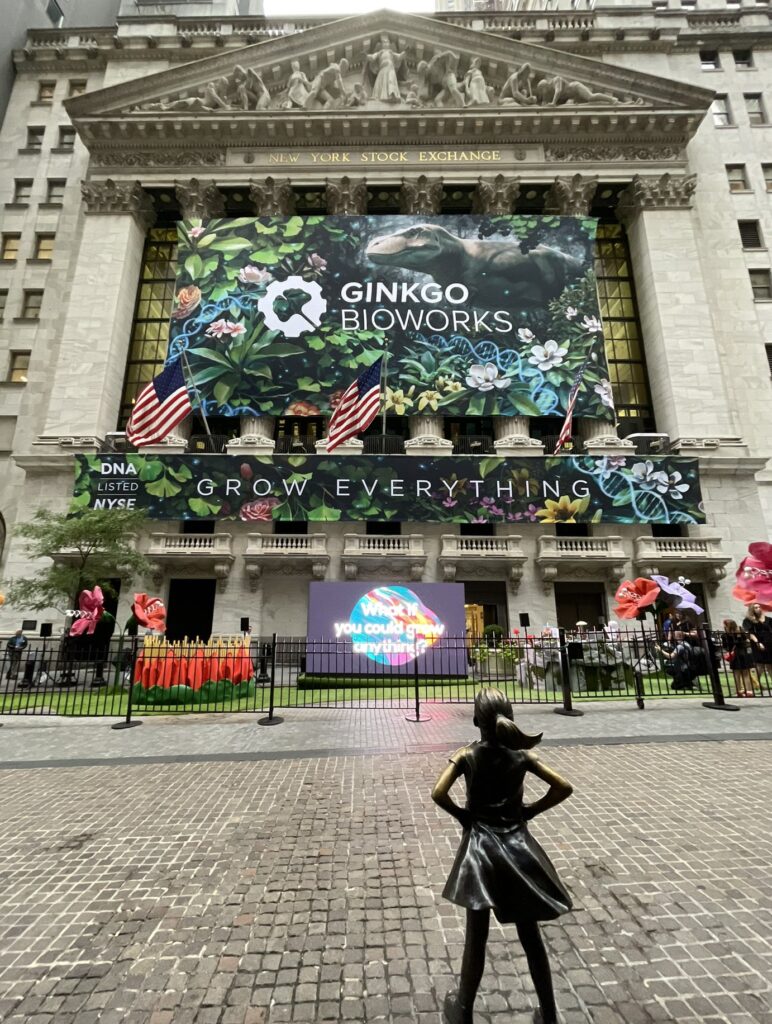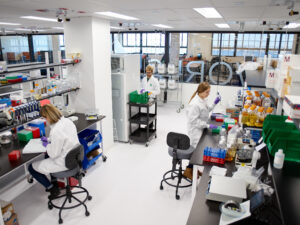With the children of the company’s co-founders right up front, the Ginkgo Bioworks team rang the bell of the New York Stock Exchange this morning, taking the synthetic biology company public. The synthetic biology powerhouse became a public company through a merger with a special purpose acquisition company (SPAC) that values the company at $15 billion and provides Ginkgo total proceeds of more than $1.6 billion.
Ginkgo has completed the SPAC business combination with Soaring Eagle Acquisition Corp., following approval by Soaring Eagle shareholders on Tuesday. Soaring Eagle is a “blank check” company led by former MGM chairman and CEO Harry E. Sloan, currently chairman and CEO of Eagle Equity Partners II.
The combined company, renamed Ginkgo Bioworks Holdings, began trading its shares today on the New York Stock Exchange today under the symbol DNA. From an opening price of $11.15, which gave the company a market capitalization of approximately $17 billion, shares rose 10% to $12.60 at 12:45 p.m. ET, before dipping to $12.18 at the close.

“For nearly two decades, my co-founders and I have been on a mission to make programming cells as easy as programming computers,” Jason Kelly, PhD, CEO and co-founder at Ginkgo, said in a statement. “Today marks an important milestone not only for the team at Ginkgo, but for synthetic biology as a whole, and I am thrilled to work with our team, partners and investors as we continue scaling our platform to solve even bigger problems with biology.”
Started in 2008 in an apartment in Cambridge, MA, Ginkgo Bioworks was founded by four MIT graduate students, including Kelly, and Tom Knight, PhD, senior research scientist at the MIT Computer Science and Artificial Intelligence Laboratory (CSAIL.) The group had one goal, Reshma Shetty, PhD, one of the co-founders, told GEN in an interview in 2019: to make biology easier to engineer.
Since then, the company has branched out into countless industries from COVID-19, to cannabinoids, to sustainable textiles and dyes for clothing.
The question may not be what areas Ginkgo is involved in, but what aren’t they involved in? “We have worked on 85 major programs through the first six months of 2021 in end markets as diverse as specialty chemicals, agriculture, food, consumer products, and pharmaceuticals,” Ginkgo said in a prospectus issued this week.
Examples of some of Ginkgo’s partnerships include launching a company (in partnership with Bayer) to improve plant-associated microbes focusing on nitrogen fixation. A partnership with Cronos-group to produce cannabinoid molecules through fermentation of engineered yeasts. Launching Motif Ingredients, a company focused on protein production for food. Partnership with Synlogic, a company using bacteria to make synthetic biologics. Partnering with Bolt threads, a leader in material production using bio-based ingredients and Huue, a company that programs microbes to produce sustainable dyes like indigo for the fashion industry and beyond.

Most of Ginkgo’s revenue is “foundry” revenue derived through the execution of license and collaboration agreements where customers license the company’s technology and intellectual property for use in developing and commercializing engineered organisms and derived products. Foundry revenue rose during the first half of this year to $44.096 million, up 41% from $31.297 million in January–June 2020.
Ginkgo is the largest synthetic biology company to go public. In April, Zymergen went public by launching a successful $575 million initial public offering (IPO) whose net proceeds were estimated to be $529.6 million, since underwriters exercised in full their option to buy additional shares.
However, Zymergen shares cratered in August, losing nearly 70% of their value, after the company acknowledged that it will make no product revenue this year and “immaterial” revenue in 2022 due to unspecified technical problems with its lead product. Zymergen’s CEO Josh Hoffman resigned immediately from the company’s helm and its board “by mutual decision,” the company said, and board chairman Jay Flatley is acting CEO.
For all of 2020, Ginkgo reported a net loss of $126.609 million on total revenue of $76.657 million, compared with 2019’s net loss of $119.327 million on total revenue of $54.184 million—a 41.5% year-over-year revenue gain. As of June 30, 2021, Ginkgo had amassed an accumulated deficit of $595.4 million. “We expect to continue to incur significant expenses and operating losses for the foreseeable future,” Ginkgo stated in its prospectus.
Before the SPAC transaction, Ginkgo Bioworks had raised a total $797.8 million in financing according to Crunchbase—including a $290 million Series E financing completed in 2019.
Kelly will continue to lead the company as CEO along with co-founder and president/COO, Shetty. Ginkgo said the rest of its founding team is also remaining. And, the team’s excitement for the future was evident on the floor of the NYSE. Today, the company tweeted, “The future won’t be mined, extracted, wired or launched. It will be grown.”






